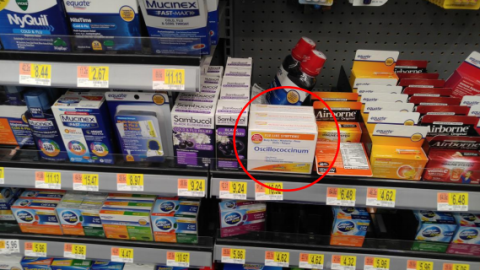Walmart sued over how it markets homeopathic products

CFI
- The lawsuit was brought by a nonprofit organization called the Center For Inquiry, which last year brought a similar suit against CVS.
- Walmart currently sells a wide variety of homeopathic products in stores and online, including its own products under the Equate brand.
- The lawsuit alleges that Walmart labels and promotes homeopathic products as if they’re actual medicines.
Walmart is being sued for consumer fraud over how it markets homeopathic products.
The Center For Inquiry (CFI), a nonprofit educational organization that brought the lawsuit, wrote in a court complaint that Walmart “uses marketing, labeling, and product placement to falsely present homeopathic products as equivalent alternatives to science-based medicines, and to represent homeopathic products as effective treatments for specific diseases and symptoms.” (Homeopathy is an 18th-century alternative medicine system that is not supported by scientific research.)
Nicholas Little, CFI’s vice president and general counsel, said Walmart is knowingly selling “snake oil.”
“Walmart sells homeopathics right alongside real medicines, in the same sections in its stores, under the same signs,” Little said. “Searches on its website for cold and flu remedies or teething products for infants yield pages full of homeopathic junk products. It’s an incredible betrayal of customers’ trust and an abuse of Walmart’s titanic retail power.”
A Walmart spokesperson issued a statement:
“We want to be the most trusted retailer, and we look to our suppliers to provide products that meet all applicable laws, including labeling laws. Our Equate private label homeopathic products are designed to include information directly stating that the claims are not based on accepted medical evidence and have not been evaluated by the FDA.”
Little argues that both Walmart and its suppliers should be held responsible for creating customer confusion.
“I think there’s a responsibility for both of them,” he told NPR. “By displaying a product under children’s cough release or, even worse, a product under asthma medication – which can kill children and does kill children – if you are displaying a product under asthma medication, you are making an affirmative claim that it treats asthma. And homeopathic products just don’t treat them.”
In 2018, the Center for Inquiry brought a similar lawsuit against CVS.
“If you search for cold and flu remedies on CVS’s website, you’ll see homeopathic products recommended and nested right along with real medicine,” the organization wrote on its website. “CVS knows that homeopathy is baseless pseudoscience. They know it doesn’t work. But they’re happy to take your money anyway.”
The FDA and homeopathic products
Homeopathic products make up a multi-billion-dollar industry that’s only expected to grow in the coming years. But despite their popularity, homeopathic products are not approved by the Food and Drug Administration.
In recent years, the FDA has signalled intentions to start regulating the industry more closely. For example, the administration proposed a risk-based enforcement approach in 2017 that “prioritizes enforcement and regulatory actions involving unapproved drug products labeled as homeopathic that pose the greatest risk to patients.” In 2018, the FDA said its updated guidelines represent a “new era” in homeopathic regulation.
However, it’s worth noting the FDA’s history of treating the homeopathy industry rather leniently.
“The FDA effectively struck a deal with the homeopathic industry that says they won’t be regulated as other drugs, as long as they don’t say they’re FDA approved,” Jonathan Turley, a law professor at George Washington University who teaches courses on labeling, told NPR.
For Little and the CFI, the new lawsuit is about helping customers avoid confusion.
“It’s a legal product,” he said. “It can be sold. But we also are far more concerned that the person [who] isn’t looking for a homeopathic product, just wants their sick kid to feel better, actually doesn’t buy one of these products by mistake.”





